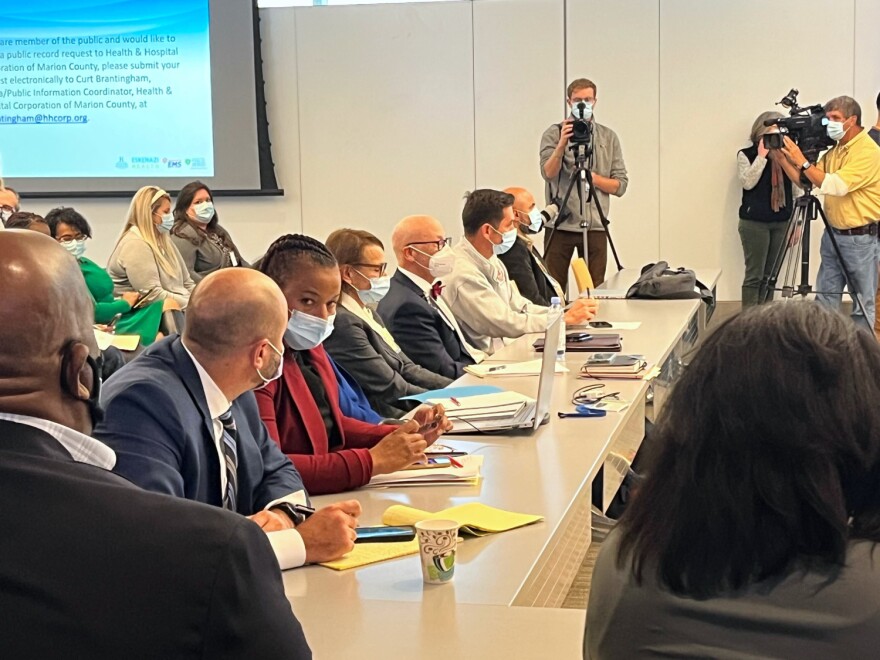The public agency that oversees the Marion County Public Health Department and Eskenazi Health has been accused of breaking the law. This comes as the agency prepares to argue a case before the Supreme Court next month.
A lawsuit filed Oct. 24 by Morgan Daly of the Indiana Statewide Independent Living Council accuses the Health and Hospital Corporation of Marion County of violating Indiana’s Open Door Law, which requires public agencies to meet to make decisions publicly.
The lawsuit alleges the Marion County public health agency did not do that when it decided to petition the U.S. Supreme Court late last year without its board of trustees taking a public vote. The Supreme Court agreed to look at the case –– HHC et. al, v Talevski –– and will hear oral arguments on Nov. 8.
In an opinion submitted as part of the lawsuit, Indiana Public Access Counselor Luke Britt said not every decision needs board approval, but “the decision to file a petition for certiorari with [the U.S. Supreme Court] is a monumental undertaking.”
“If an act as momentous as petitioning [the U.S. Supreme Court] to reverse the Seventh Circuit is treated as a rote, secretarial task, then a board simply becomes a performative, rubber stamp for executive staff,” Britt wrote.
HHC argues it did not violate Indiana’s Open Door Law and that its “statutory corporate structure” allows the board to delegate decisions regarding legal defense to its executive staff, headed by CEO Paul Babcock.
In a response to the public access complaint, HHC counsel Tenley Drescher-Rhoades said the agency acted in this case as it does in the nearly 3,000 other litigation matters it’s involved in every year.
“It would not be practical, feasible, or in the Corporation’s or the public’s best interest for the Corporation’s governing body to attempt or have to make litigation decisions in each of these matters, as to which they have no day-to-day oversight, involvement, or knowledge, which is why they long ago delegated this authority to the Corporations’ executive staff,” Drescher-Rhoades said in the response.
In the Supreme Court case mentioned in the lawsuit, HHC questions whether people on federal assistance programs like Medicaid can sue states if their rights are violated. There is decades of legal precedent in which Medicaid beneficiaries have sued states and won. Legal experts and patient advocates are concerned this case threatens the rights of millions of Americans to hold states accountable.
More than 82 million Americans are covered by Medicaid –– almost a quarter of the entire U.S. population.
“What happens if Marion County wins? It's probably a slower rolling disaster than we saw after Dobbs,” said Sara Rosenbaum, a professor of health law and policy at George Washington University, referencing the recent Supreme Court decision to reverse the Constitutional right to abortion. “Suddenly you have a situation where there will be no consequences, literally no consequences, if a state misbehaves.”
Other groups and Republican officials such as Indiana Attorney General Todd Rokita have sided with Marion County, arguing that when private actors –– like Medicaid beneficiaries –– sue states and their agencies in federal court, it cripples states with legal fees. They also argue that there are other avenues that beneficiaries can use to voice their grievances if states violate their rights.
Patient advocates say these avenues are often not enough to hold states accountable or stop the harm to beneficiaries, who are mostly poor, elderly or have disabilities.
The case has drawn national attention from public health and legal groups across the country, including members of Congress like House Speaker Nancy Pelosi and Majority Whip James Clybrun.
Indiana Democratic Congressman Andre Carson tweeted, “I join community activists and concerned citizens in urging the HHC board to reconvene and vote to withdraw this case, which has the potential to affect thousands of vulnerable individuals across the country.”
The local group Concerned Clergy of Indianapolis, a group of African American pastors and community members, asked HHC to withdraw its lawsuit.
“It is frustrating and sad to know that our community’s health agency is now taking action that can tangibly harm the health of millions of the most vulnerable Americans,” the statement said.
Daly, who filed the Open Door Law case against Health and Hospital Corporation of Marion County, wants the Marion County Superior Court to fine board members and award her attorney fees.
It’s unclear if any outcome of the Open Door lawsuit could have any direct impact on the Supreme Court case.
This story comes from a reporting collaboration that includes the Indianapolis Recorder and Side Effects Public Media — a public health news initiative based at WFYI. Contact Farah at fyousry@wfyi.org. Follow on Twitter: @Farah_Yousrym.
Copyright 2022 WFYI Public Media. To see more, visit WFYI Public Media.


